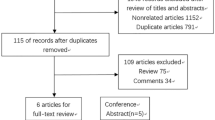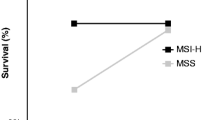Abstract
Background
Rectal cancer patients with microsatellite instability (MSI-H) are candidates for immunotherapy. However, there is little evidence on its effect on overall survival (OS).
Methods
Retrospective analysis of stage II–IV rectal adenocarcinoma patients in the National Cancer Database (NCDB) between 2010 and 2019. Propensity score matching was adjusted for baseline and treatment confounders. The cohort was divided into patients who received immunotherapy and matched controls. The primary outcome was OS.
Results
5175/206,615 (2.5%) patients with rectal adenocarcinoma underwent immunotherapy. These patients were younger (58 vs 62 years; p < 0.001), more often male (64.4% vs 61.7%; p < 0.001), were more likely to have private insurance (50.8% vs 43.4%; p < 0.001), more metastatic disease at presentation (clinical TNM stage IV–80.8% vs 23.3%; p < 0.001), presented with larger tumors (median: 5 cm vs. 4.2 cm; p < 0.001) and less often underwent surgery (33.7% vs. 69.9%; p < 0.001), radiation therapy (21.5% vs 57.4%; p < 0.001), and standard chemotherapy (38.1% vs 61%; p < 0.001) than controls. After matching, 488 patients were in each group. OS was significantly shorter in the immunotherapy group (mean survival: 56.4 months (95% CI: –53.03–59.86)) compared to controls (mean survival: 70.5 months (95% CI: –66.15–74.92) (p = 0.004)). Cox regression analysis of factors associated with OS demonstrated that immunotherapy was associated with increased mortality (HR 2.16; 95% CI: 2.09–2.24; p < 0.001). After clinical staging stratification, immunotherapy was associated with improved OS in stage IV (HR 0.91, 95% CI: 0.88–0.95; p < 0.001) but lower survival in stage II (HR 2.38; 95% CI: 2.05–2.77; p < 0.001) and stage III (HR 2.43; 95% CI: 2.18–2.7; p < 0.001) patients.
Conclusion
Immunotherapy showed modest increase in OS in stage IV metastatic rectal cancer. OS was significantly lower in stage II–III disease treated with immunotherapy.



Similar content being viewed by others
Data availability
Data available upon reasonable request to first author.
References
Osarogiagbon RU, Sineshaw HM, Unger JM, Acuña-Villaorduña A, Goel S (2021) Immune-based cancer treatment: addressing disparities in access and outcomes. Am Soc Clin Oncol Educ Book 41:1–13. https://doi.org/10.1200/EDBK_323523. PMID: 33830825
Golubovskaya V, Wu L (2016) Different subsets of T cells, memory, effector functions, and CAR-T immunotherapy. Cancers (Basel) 8:36. https://doi.org/10.3390/cancers8030036. PMID: 26999211; PMCID: PMC4810120
Weber R, Fleming V, Hu X et al (2018) Myeloid-derived suppressor cells hinder the anti-cancer activity of immune checkpoint inhibitors. Front Immunol 9:1310. https://doi.org/10.3389/fimmu.2018.01310. PMID: 29942309; PMCID: PMC6004385
Scheller J, Engelowski E, Moll JM, Floss DM (2019) Immunoreceptor engineering and synthetic cytokine signaling for therapeutics. Trends Immunol 40:258–272. https://doi.org/10.1016/j.it.2019.01.001. Epub 2019 Feb 6 PMID: 30738638
Kimiz-Gebologlu I, Gulce-Iz S, Biray-Avci C (2018) Monoclonal antibodies in cancer immunotherapy. Mol Biol Rep 45:2935–2940. https://doi.org/10.1007/s11033-018-4427-x. Epub 2018 Oct 11 PMID: 30311129
O’Leary C, McSorley L, Hennessy B, Grogan L, Breathnach O, Morris P (2020) Challenges associated with systemic therapy for older patients with inoperable non-small cell lung cancer. Expert Opin Pharmacother 21:2185–2194. https://doi.org/10.1080/14656566.2020.1801639. Epub 2020 Aug 31 PMID: 32866411
Hodi FS, O’Day SJ, McDermott DF et al (2010) Improved survival with ipilimumab in patients with metastatic melanoma. N Engl J Med 363:711–723. https://doi.org/10.1056/NEJMoa1003466. Epub 2010 Jun 5. Erratum in: N Engl J Med. 2010 Sep 23;363(13):1290. PMID: 20525992; PMCID: PMC3549297
Gandhi L, Rodríguez-Abreu D, Gadgeel S et al (2018) Pembrolizumab plus chemotherapy in metastatic non-small-cell lung cancer. N Engl J Med 378:2078–2092. https://doi.org/10.1056/NEJMoa1801005. Epub 2018 Apr 16 PMID: 29658856
Lee DH (2021) Update of early phase clinical trials in cancer immunotherapy. BMB Rep 54(1):70–88
Siegel RL, Miller KD, Jemal A (2020) Colorectal cancer statistics, 2020. CA Cancer J Clin 70145–164. https://doi.org/10.3322/caac.21601. Epub 2020 Mar 5. PMID: 32133645
Keller DS, Berho M, Perez RO, Wexner SD, Chand M (2020) The multidisciplinary management of rectal cancer. Nat Rev Gastroenterol Hepatol 17:414–429. https://doi.org/10.1038/s41575-020-0275-y. Epub 2020 Mar 12 PMID: 32203400
Folkesson J, Birgisson H, Pahlman L, Cedermark B, Glimelius B, Gunnarsson U (2005) Swedish rectal cancer trial: long lasting benefits from radiotherapy on survival and local recurrence rate. J Clin Oncol 23:5644–5650. https://doi.org/10.1200/JCO.2005.08.144. PMID: 16110023
Cercek A, Roxburgh CSD, Strombom P et al (2018) Adoption of total neoadjuvant therapy for locally advanced rectal cancer. JAMA Oncol 4(6):e180071. https://doi.org/10.1001/jamaoncol.2018.0071. Epub 2018 Jun 14. PMID: 29566109; PMCID: PMC5885165
Riesco-Martinez MC, Fernandez-Martos C, Gravalos-Castro C et al (2020) Impact of total neoadjuvant therapy vs. standard chemoradiotherapy in locally advanced rectal cancer: a systematic review and meta-analysis of randomized trials. Cancers (Basel) 12:3655. https://doi.org/10.3390/cancers12123655. PMID: 33291454; PMCID: PMC7762140.
São Julião GP, Habr-Gama A, Vailati BB, Araujo SEA, Fernandez LM, Perez RO (2017) New strategies in rectal cancer. Surg Clin North Am 97:587–604. https://doi.org/10.1016/j.suc.2017.01.008. PMID: 28501249
Thomopoulou K, Manolakou S, Messaritakis I et al (2020) Brain and bone marrow metastases from rectal cancer. Ann Gastroenterol 33(1):95–97. https://doi.org/10.20524/aog.2019.0423. Epub 2019 Oct 8. PMID: 31892804; PMCID: PMC6928473
Haraldsdottir S, Einarsdottir HM, Smaradottir A, Gunnlaugsson A, Halfdanarson TR (2014) Krabbamein í ristli og endaþarmi [Colorectal cancer - review]. Laeknabladid 100:75–82. Icelandic. https://doi.org/10.17992/lbl.2014.02.531. PMID: 24639430
Le DT, Uram JN, Wang H et al (2015) PD-1 Blockade in tumors with mismatch-repair deficiency. N Engl J Med 372:2509–20. https://doi.org/10.1056/NEJMoa1500596. Epub 2015 May 30. PMID: 26028255; PMCID: PMC4481136
Le DT, Kim TW, van Cutsem E et al (2020) Phase II open-label study of pembrolizumab in treatment-refractory, microsatellite instability-high/mismatch repair-deficient metastatic colorectal cancer: KEYNOTE-164. J Clin Oncol 38:11–19. https://doi.org/10.1200/JCO.19.02107. Epub 2019 Nov 14. PMID: 31725351; PMCID: PMC7031958
Turkes FS, Crux R, Cunningham D, Athauda A, Kalaitzaki E, Musallam A et al (2019) iSCORE: Immunotherapy sequencing in colon and rectal cancer. Ann Oncol 30
Kanda Y (2012) Investigation of the freely available easy-to-use software ‘EZR’ for medical statistics. Bone Marrow Transplant 48:452–458. https://doi.org/10.1038/bmt.2012.244. Epub 2012 Dec 3. PMID: 23208313; PMCID: PMC3590441
Sanmamed MF, Chen L (2018) A paradigm shift in cancer immunotherapy: from enhancement to normalization. Cell 175:313–326. https://doi.org/10.1016/j.cell.2018.09.035. Erratum. In: Cell. 2019 Jan 24; 176(3):677. PMID: 30290139; PMCID: PMC6538253
Corrò C, Dutoit V, Koessler T (2021) Emerging trends for radio-immunotherapy in rectal cancer. Cancers (Basel) 13:1374. https://doi.org/10.3390/cancers13061374. PMID: 33803620; PMCID: PMC8003099
Borst J, Busselaar J, Bosma DMT, Ossendorp F (2021) Mechanism of action of PD-1 receptor/ligand targeted cancer immunotherapy. Eur J Immunol 51:1911–1920. https://doi.org/10.1002/eji.202048994. Epub 2021 Jun 21. PMID: 34106465; PMCID: PMC8453912
Seidel JA, Otsuka A, Kabashima K (2018) Anti-PD-1 and Anti-CTLA-4 therapies in cancer: mechanisms of action, efficacy, and limitations. Front Oncol 8:86. https://doi.org/10.3389/fonc.2018.00086. PMID: 29644214; PMCID: PMC5883082
Ganesh K, Stadler ZK, Cercek A et al (2019) Immunotherapy in colorectal cancer: rationale, challenges and potential. Nat Rev Gastroenterol Hepatol 16:361–375. https://doi.org/10.1038/s41575-019-0126-x. PMID: 30886395; PMCID: PMC7295073
Lenz HJ, van Cutsem E, Luisa Limon M et al (2022) First-line nivolumab plus low-dose ipilimumab for microsatellite instability-high/mismatch repair-deficient metastatic colorectal cancer: the phase II CheckMate 142 study. J Clin Oncol 40:161–170. https://doi.org/10.1200/JCO.21.01015. Epub 2021 Oct 12 PMID: 34637336
Shiu K-K, Andre T, Kim TW et al (2021) KEYNOTE-177: phase III randomized study of pembrolizumab versus chemotherapy for microsatellite instability-high advanced colorectal cancer. J Clin Oncol 39
André T, Shiu KK, Kim TW et al (2020) KEYNOTE-177 Investigators. Pembrolizumab in microsatellite-instability-high advanced colorectal cancer. N Engl J Med 383:2207–2218. https://doi.org/10.1056/NEJMoa2017699. PMID: 33264544
Cercek A, Lumish M, Sinopoli J et al (2022) PD-1 Blockade in mismatch repair-deficient, locally advanced rectal cancer. N Engl J Med 386:2363–2376
Author information
Authors and Affiliations
Contributions
NH: conceptualization, methodology, validation, formal analysis, investigation, data curation, writing—original draft, and writing—review and editing; SHE: methodology, validation, formal analysis, data curation, and writing—review and editing; MF: methodology, validation, formal analysis, data curation, and writing—review and editing; ZG: methodology, validation, formal analysis, data curation, and writing—review and editing; RG: methodology, validation, formal analysis, data curation, and writing—review and editing; AN: conceptualization, validation, data curation, and writing—review and editing; SW: conceptualization, methodology, resources, writing—review and editing, supervision, and project administration.
Corresponding author
Ethics declarations
Competing interests
None of the authors report any relevant financial disclosures. Dr. Wexner reports receiving consulting fees from ARC/Corvus, Astellas, Baxter, Becton Dickinson, GI Supply, ICON Language Services, Intuitive Surgical, Leading BioSciences, Livsmed, Medtronic, Olympus Surgical, Stryker, Takeda and receiving royalties from Intuitive Surgical and Karl Storz Endoscopy America Inc.
Additional information
Publisher's Note
Springer Nature remains neutral with regard to jurisdictional claims in published maps and institutional affiliations.
Presentation: Online presentation at the ASCO annual meeting, June 2–6, 2023, Chicago, IL, USA.
Supplementary Information
Below is the link to the electronic supplementary material.
Rights and permissions
Springer Nature or its licensor (e.g. a society or other partner) holds exclusive rights to this article under a publishing agreement with the author(s) or other rightsholder(s); author self-archiving of the accepted manuscript version of this article is solely governed by the terms of such publishing agreement and applicable law.
About this article
Cite this article
Horesh, N., Emile, S.H., Freund, M.R. et al. Immunotherapy in rectal cancer patients—a propensity score matched analysis of the National Cancer Database. Int J Colorectal Dis 39, 8 (2024). https://doi.org/10.1007/s00384-023-04574-8
Accepted:
Published:
DOI: https://doi.org/10.1007/s00384-023-04574-8




